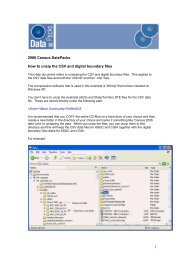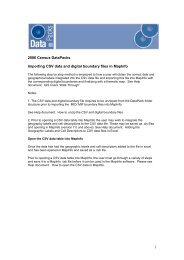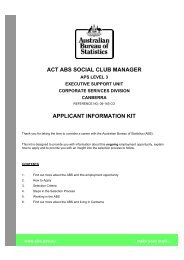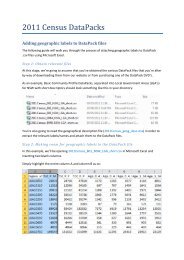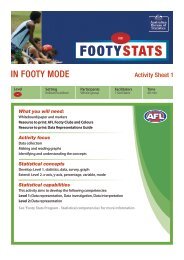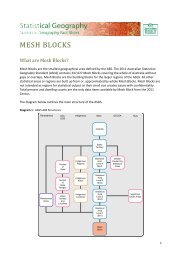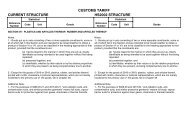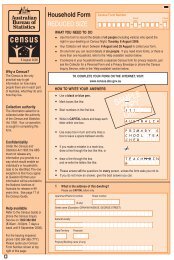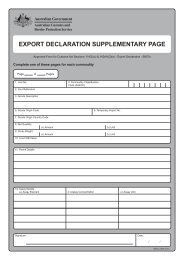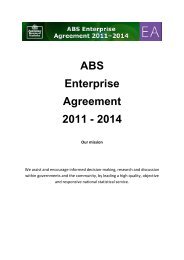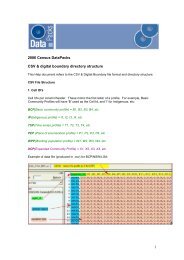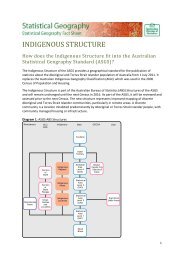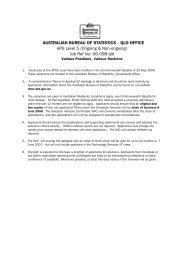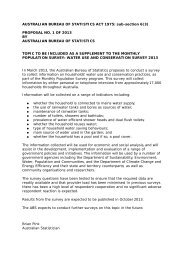Stats Talk Edition 14 (1) - Australian Bureau of Statistics
Stats Talk Edition 14 (1) - Australian Bureau of Statistics
Stats Talk Edition 14 (1) - Australian Bureau of Statistics
You also want an ePaper? Increase the reach of your titles
YUMPU automatically turns print PDFs into web optimized ePapers that Google loves.
<strong>Stats</strong> <strong>Talk</strong><br />
Newsletter <strong>of</strong> the Client Liaison Unit, ABS, Perth<br />
ABOUT THIS<br />
NEWSLETTER<br />
Issue No.<strong>14</strong> April 2005<br />
Australia Day Award<br />
30 years <strong>of</strong> service for Labour Force Interviewer<br />
The main aims <strong>of</strong> this newsletter<br />
are to facilitate your involvement in<br />
the development and review <strong>of</strong> ABS<br />
social and economic statistics, to<br />
provide information on current<br />
developments, and to promote<br />
discussion on emerging statistical<br />
issues.<br />
CONTACTS<br />
For more information about<br />
newsletter articles, to alter mailing<br />
details or to receive a personal<br />
copy <strong>of</strong> this newsletter, contact the<br />
Client Liaison Unit.<br />
Margaret Garner<br />
!(08) 9360 5127<br />
Andy Separovic<br />
!(08) 9360 5920<br />
Fax:<br />
(08) 9360 5872<br />
Alan Hubbard, ABS Regional Director, Western<br />
Australia presented Jenny Bromley with her<br />
Australia Day Award for 30 years <strong>of</strong> service to the<br />
ABS<br />
Jenny Bromley was presented with her<br />
award for 30 years <strong>of</strong> service with the ABS<br />
at a special Australia Day morning tea.<br />
Jenny works on the Labour Force Survey<br />
(LFS) and was joined at morning tea by a<br />
group <strong>of</strong> past and present members <strong>of</strong> the<br />
LFS Interviewers Panel (see photo below)<br />
who have, between them, amassed an<br />
incredible 300 years <strong>of</strong> service collecting<br />
information for the LFS and associated<br />
surveys.<br />
The LFS was first conducted in 1960 and<br />
the information collected is obtained from<br />
occupants <strong>of</strong> randomly selected dwellings<br />
by specially trained interviewers, like<br />
Jenny. The Year Book 2005 features an<br />
article on the history <strong>of</strong> the Monthly<br />
Labour Force Survey.<br />
.<br />
email:<br />
<br />
<br />
ABS Web Site:<br />
<br />
L to R: Lauren Stanes, Peta Cuthbertson, Norma Foley, Irene McGrath,<br />
Rikki Mardon, Jenny Bromley, Lorraine Crawford, Joy Spencer, Janet Wallen,<br />
Jean Ritchie, Pat Rigney, Dianne Keyes, Bev Farrow and Val O’Reilly.<br />
In this issue...<br />
PUBLICATION ORDERS<br />
To obtain ABS publications,<br />
contact:<br />
National Information Referral<br />
Service (NIRS)<br />
! 1300 135 070<br />
Or visit the<br />
ABS Bookshop<br />
! (08) 9360 5307<br />
Level 15 Exchange Plaza,<br />
2 The Esplanade, Perth WA 6000<br />
1<br />
NSS Update<br />
Year Book 2005<br />
International Aid<br />
Census Update<br />
Training Opportunities
View from the Top<br />
Indigenous Engagement Manager<br />
Alan Hubbard<br />
Government Statistician and<br />
ABS Regional Director,<br />
Western Australia.<br />
ABS Centenary<br />
From the Commonwealth Government buildings in<br />
1905 in Melbourne to ABS House in Canberra today,<br />
the ABS has consistently served the nation by the<br />
gathering, analysis and dissemination <strong>of</strong> independent<br />
<strong>of</strong>ficial statistics. This includes the conduct <strong>of</strong> <strong>14</strong><br />
population censuses as well as regular production <strong>of</strong><br />
household name statistics like Labour Force and<br />
Consumer Price Index. Locally the ABS continues to<br />
support informed decision making and provides fora<br />
to identify and discuss State statistical needs, both<br />
currently and for future planning. The ABS will be<br />
celebrating the Centenary throughout the year.<br />
Western Australia’s Population reaches 2 million<br />
Western Australia's population reached 2 million<br />
during the week commencing 10 January 2005. This<br />
population milestone now forms part <strong>of</strong> Western<br />
Australia's demographic history. As the calculation<br />
used to determine population growth takes into<br />
account all the information that we have available<br />
from births, deaths, interstate and overseas arrivals<br />
and departures, and the 2001 Population Census, it<br />
was not feasible to determine who exactly the 2<br />
millionth Western <strong>Australian</strong> would have been.<br />
However, it could have been a person born around<br />
that time, a person who arrived as a permanent<br />
settler in Western Australia, or an <strong>Australian</strong><br />
returning home after living overseas. The state<br />
reached its first million in 1970.<br />
State Statistical Forum<br />
The State Statistical Forum held in February<br />
focussed on new and ongoing statistical priorities<br />
that were common to several states. The Statistician<br />
provided detailed responses on these needs to the<br />
state representatives attending the Forum. David<br />
Smith from the Department <strong>of</strong> Treasury and Finance<br />
represented Western <strong>Australian</strong> interests. Planned<br />
improvements to statistics on natural resource<br />
management, water accounts, tourism and the state<br />
accounts were all addressed in the Statistician’s<br />
response. Statistical priorities raised by WA<br />
government agencies that were not covered by the<br />
Forum will be pursued by the WA Office.<br />
Census 2006 Planning<br />
A detailed plan for the Census Operations in<br />
Western Australia has now been completed. Once<br />
this plan has been approved by ABS management,<br />
the next step will be to build the local Census<br />
management team.<br />
Alan Hubbard<br />
Regional Director<br />
I belong to the Ngarinyin people from the Kimberley<br />
in WA and grew up on Gibb River Station<br />
(Ngallangunda Aboriginal Corporation).<br />
My working history includes just over 12 years<br />
working for the Aboriginal and Torres Strait Islander<br />
Commission/Services and then the Department <strong>of</strong><br />
Communication Information Technology and the<br />
Arts. I commenced my position as the ABS<br />
Indigenous Engagement Manager (IEM) for WA in<br />
November 2004.<br />
My role as IEM is to provide a bridge between the<br />
ABS and Aboriginal and Torres Strait Islander<br />
communities in accessing data and information. The<br />
duties and objectives <strong>of</strong> the IEM position include:<br />
# Building and maintaining networks with<br />
Aboriginal and Torres Strait Islander<br />
communities and organisations (including<br />
engaging and seeking greater participation);<br />
# Advise on appropriate materials to raise<br />
statistical awareness;<br />
# Return ABS information to Aboriginal and Torres<br />
Strait Islander Communities;<br />
# Raise awareness <strong>of</strong> data collection processes;<br />
and<br />
# Provide support and assistance to ABS surveys.<br />
My aims are:<br />
# To increase awareness <strong>of</strong> the ABS to Aboriginal<br />
and Torres Strait Islander communities,<br />
organisations and agencies;.<br />
# To promote the benefits, assistance and<br />
advantages that can be gained by using ABS<br />
data; and<br />
# To ensure that ABS data collected from the<br />
Aboriginal and Torres Strait Islander community<br />
is easily accessible to Government Departments<br />
and Organisations involved in the process <strong>of</strong><br />
planning services for indigenous people.<br />
For further information contact Marissa Russ<br />
!(08) 9360 5910 or<br />
email: .<br />
2<br />
Marissa Russ<br />
Indigenous Engagement Manager
Community Pr<strong>of</strong>ile Series<br />
The Centenary <strong>of</strong> the ABS<br />
.<br />
Government, private and not for pr<strong>of</strong>it service<br />
organisations are increasingly aware that they must<br />
have a clear understanding <strong>of</strong> the demographic,<br />
socio-economic and cultural characteristics <strong>of</strong> their<br />
clients so that they can plan and deliver culturally<br />
appropriate services.<br />
To assist service providers in responding to their<br />
diverse communities and to promote recognition <strong>of</strong><br />
diversity in Western Australia, the Office <strong>of</strong><br />
Multicultural Interests has worked with the ABS to<br />
produce a series <strong>of</strong> Community Pr<strong>of</strong>iles based on<br />
the 2001 Census <strong>of</strong> Population and Housing.<br />
The <strong>14</strong> groups included in the first series <strong>of</strong> pr<strong>of</strong>iles,<br />
identified by birthplace groups, are a mix <strong>of</strong> both<br />
established and emerging ethnic communities. They<br />
include Malaysia, Vietnam, Indonesia, China, India,<br />
Italy, Poland, Germany, Netherlands, Croatia,<br />
Bosnia and Herzegovina, Afghanistan, Iraq and<br />
communities from the Horn <strong>of</strong> Africa.<br />
The Community Pr<strong>of</strong>iles focus on socio-economic<br />
factors, such as labour force participation,<br />
occupation, income, housing tenure and family.<br />
They provide a key source <strong>of</strong> information for those<br />
planning and delivering services to Western<br />
Australia's culturally diverse community.<br />
The analysis <strong>of</strong> socio-economic indicators contained<br />
within the various Community Pr<strong>of</strong>iles raises a<br />
number <strong>of</strong> issues, including the level <strong>of</strong><br />
socio-economic disadvantage among certain<br />
groups. These have important implications for<br />
service providers.<br />
The Office <strong>of</strong> Multicultural Interests will continue to<br />
make available data on cultural diversity to<br />
government agencies, community organisations and<br />
researchers. It is only with such knowledge that<br />
programs and services can adequately meet the<br />
needs <strong>of</strong> specific groups.<br />
Dr Leela de Mel, Executive Director<br />
Office <strong>of</strong> Multicultural Interests<br />
The pr<strong>of</strong>iles can be viewed and downloaded from<br />
the Office <strong>of</strong> Multicultural Interests web site at<br />
www.omi.wa.gov.au<br />
or<br />
contact the Office <strong>of</strong> Multicultural Interests on<br />
!9222 8800 to obtain copies <strong>of</strong> the pr<strong>of</strong>iles.<br />
In 2005 the <strong>Australian</strong> <strong>Bureau</strong> <strong>of</strong> <strong>Statistics</strong><br />
celebrates its centenary, 100 years as the<br />
national statistical agency.<br />
The <strong>Bureau</strong> came into existence on the 8 December<br />
1905 when the Census and <strong>Statistics</strong> Act 1905<br />
(Cwlth) was given assent. The following year George<br />
Handley Knibbs was appointed Commonwealth<br />
Statistician and given the task <strong>of</strong> establishing the<br />
<strong>of</strong>fice. There were 10 staff appointed to the<br />
Commonwealth <strong>Bureau</strong> <strong>of</strong> Census and <strong>Statistics</strong> in<br />
1906. The <strong>Bureau</strong> was established within the<br />
Department <strong>of</strong> Home Affairs. In the early 1930s the<br />
<strong>Bureau</strong> was moved under the auspices <strong>of</strong> the<br />
Department <strong>of</strong> the Treasury.<br />
Initially the role <strong>of</strong> the Commonwealth Statistician was<br />
primarily seen as a co-ordination role, bringing<br />
together the statistics <strong>of</strong> each <strong>of</strong> the different states.<br />
However it quickly became clear that the task was<br />
somewhat more complicated than that. In 1924,<br />
Tasmania was the first state statistical <strong>of</strong>fice to<br />
integrate with the Commonwealth <strong>Bureau</strong>. The rest <strong>of</strong><br />
the state statistical <strong>of</strong>fices integrated in the late 1950s.<br />
Parliament House, Canberra<br />
3<br />
Views <strong>of</strong> the ABS display at<br />
Parliament House which ran<br />
during February and March<br />
2005 to commemorate the ABS<br />
Centenary .<br />
The Commonwealth<br />
<strong>Bureau</strong> <strong>of</strong> Census and<br />
<strong>Statistics</strong> became the<br />
<strong>Australian</strong> <strong>Bureau</strong> <strong>of</strong><br />
<strong>Statistics</strong> in 1975,<br />
independent <strong>of</strong> other<br />
departments. Today the<br />
ABS has just under<br />
3,000 staff distributed<br />
throughout the state and<br />
territories in each capital<br />
city.
Year Book Australia 2005<br />
NSS Update<br />
The Year Book Australia 2005 provides a<br />
comprehensive and definitive source <strong>of</strong> information<br />
about Australia. Over 900 pages long, the Year<br />
Book spans topics which cover Australia's<br />
economic position and social conditions, as well as<br />
articles about our community and environment.<br />
To celebrate 100 years <strong>of</strong> <strong>of</strong>ficial statistics, both the<br />
hard copy Year Book and its CD-ROM companion<br />
are presented as a special <strong>of</strong>fer in one package,<br />
making it great value for money. The CD-ROM is<br />
the ideal resource for the business computer<br />
network and it complements the hard cover version<br />
by giving you rapid access to every subject.<br />
A simple interface and a full electronic index make it<br />
a convenient source <strong>of</strong> the up to date information<br />
that every business needs from time to time.<br />
Special articles featured in the Year Book 2005<br />
include:<br />
# Temperature measurement and the Stevenson<br />
screen<br />
# Sustainable micr<strong>of</strong>inance in Vietnam<br />
# Population figures for state grants – an<br />
historical perspective<br />
# Aboriginal and Torres Strait Islander <strong>Australian</strong>s<br />
– projections 2001 to 2009<br />
# Same-sex couple families<br />
# The population census – a brief history<br />
# Selected findings from the 2002 National<br />
Aboriginal and Torres Strait Islander Social<br />
Survey<br />
# Labour force experience<br />
# Working arrangements<br />
# Young people in employment<br />
Andy Separovic<br />
NSS Coordinator<br />
NSS Networks<br />
As part <strong>of</strong> the NSS strategy, forums and networks have<br />
been established to allow agencies to share information and<br />
experiences about their collection and dissemination <strong>of</strong><br />
statistics and data management practices.<br />
<strong>Australian</strong> Government Statistical Forum (AGSF)<br />
The AGSF provides a vehicle for senior staff in <strong>Australian</strong><br />
Government agencies to discuss key national and<br />
international statistical developments. The role <strong>of</strong> the forum<br />
is to: advance the NSS and consider strategic matters <strong>of</strong><br />
importance to the effective operation <strong>of</strong> the NSS; consider<br />
matters <strong>of</strong> relevance to producers <strong>of</strong> statistical services<br />
within the <strong>Australian</strong> Government and share information on<br />
developments in each agency's activities, with regard to<br />
national statistical information; and to identify opportunities<br />
for collaborative work.<br />
State and Territory Forums<br />
In Western Australia the Statistical Policy Committee<br />
progresses NSS initiatives and provides a broad<br />
perspective <strong>of</strong> the strategic statistical information needs and<br />
priorities across the State Government sector.<br />
<strong>Stats</strong> Network<br />
The <strong>Stats</strong> Network is comprised <strong>of</strong> managers from<br />
<strong>Australian</strong> Government agencies who are involved in the<br />
preparation <strong>of</strong> statistics and their associated analysis and<br />
research. It provides a forum for discussion and open<br />
communication on statistical and related matters as they<br />
affect <strong>Australian</strong> Government Agencies.<br />
For further information contact Andy Separovic !(08)<br />
9360 5385 or<br />
email: <br />
NDN Update<br />
A national platform for acquiring, sharing and integrating data relevant to policy and research<br />
This special ABS centenary <strong>of</strong>fer, is great value<br />
for money. Order online at www.abs.gov.au, or<br />
telephone 1300 135 070, and have your credit<br />
card details ready.<br />
STOCKS ARE LIMITED<br />
Order Now<br />
www.abs.gov.au<br />
4<br />
$ Paul Vickers, NDN representative will be<br />
visiting Perth during April to further initiatives<br />
currently being discussed with the Western<br />
<strong>Australian</strong> Land Information Service<br />
(WALIS), and the Department <strong>of</strong> Land<br />
Information (DOLI).<br />
$ To generate discussion about metadata<br />
harmonisation and model development, four<br />
discussion forums have been established on<br />
the National Data Network web site. These<br />
forums focus on the key areas <strong>of</strong>: NDN<br />
Metadata Model, Discovery Metadata,<br />
Definitional Metadata and Quality Metadata.<br />
About ABS Training courses<br />
Using SuperTABLE (NEW)<br />
This half day computer based workshop aims to<br />
provide participants with the skills to use this<br />
powerful s<strong>of</strong>tware for manipulating multidimensional<br />
ABS datasets (datacubes). SuperTABLE S<strong>of</strong>tware is<br />
used to creat tables that can be easily converted to<br />
Excel format. As the ABS is progressively releasing<br />
more data in SuperTABLE format, users <strong>of</strong> data<br />
cubes will need to be familiar with SuperTABLE. This<br />
workshop will equip participants with the skills to:<br />
# Access SuperTABLE;<br />
# Create basic tables; and<br />
# Manipulate data.<br />
This course would be useful for ABS datacube users<br />
and Aus<strong>Stats</strong> subscribers who have little or no<br />
experience with SuperTABLE.<br />
Group activities are a great way to put what you learn into practice.<br />
Time Series made Simple<br />
This half day workshop aims to provide participants<br />
with basic understanding <strong>of</strong> statistical time series,<br />
including an understanding <strong>of</strong> how to gain a clearer<br />
picture <strong>of</strong> the trends, cycles, seasonal variation, and<br />
irregular movements that may be present in the data.<br />
Participants will be able to:<br />
# Identify a time series<br />
# Detect trend, cycles and seasonal<br />
variation; and<br />
# Smooth time series data using Henderson<br />
weights.<br />
The workshop is ideally suited to people who need to<br />
analyse time series data, as well as those who need<br />
an understanding <strong>of</strong> the components which make up<br />
a time series.<br />
Turning Data Into Information<br />
This two day course develops skills in transforming<br />
data into meaningful written information, including:<br />
# Understanding how the collection and<br />
compilation <strong>of</strong> data affects its usefulness,<br />
quality and relevance;<br />
# Understanding various statistical<br />
techniques for use in data analysis;<br />
# Communicating results and writing<br />
effective reports; and<br />
# Constructing meaningful tables and<br />
graphs.<br />
The course is best suited to people involved in using<br />
data to produce a report or social commentary, or<br />
with analysing and describing data that has been<br />
collected in surveys or through administrative<br />
processes.<br />
Understanding Demographic Data<br />
This one day course develops participants’<br />
understanding and use <strong>of</strong> demographic data. The<br />
course provides an awareness <strong>of</strong> demographic data<br />
produced by the ABS and gives an introduction to<br />
demographic techniques which enable comparisons<br />
<strong>of</strong> demographic data between regions and over time.<br />
Key issues to be covered include:<br />
# Relationship <strong>of</strong> Population Census counts<br />
to Estimated Resident Population Data<br />
# Components <strong>of</strong> population change; births,<br />
deaths, internal and overseas migration;<br />
# Changing demographic trends; and<br />
# Tools for demographic analysis.<br />
This course would be useful for anyone who wants to<br />
improve their understanding <strong>of</strong> demographic data<br />
and processes that shape the population, or who<br />
want to use demographic data to describe changes<br />
in the population and their potential effects.<br />
Analyse and describe data that has been collected in surveys.<br />
For further information about any <strong>of</strong> these courses, or ABS Statistical Training in general,<br />
please contact Carolann Hoad !(08) 9360 5947 or<br />
email: <br />
5
Library Extension Program<br />
ABS Award Winners<br />
L to R: James Separovic, Mirjana Paunoska, Anthony Carberry,<br />
David Neill , Renee Chalon, Ian Mackley, Dan Midalia, Lorraine<br />
Crawford, David Webb, Alan Hubbard, Joan Sibenaler, Debbie<br />
Cullen, Marjorie Hepburn, Tom Pougher, Michael LeSouef.<br />
Maita Wilson (pictured above) is the new<br />
Coordinator <strong>of</strong> the Library Extension Program (LEP)<br />
in Western Australia, taking over the reins from<br />
David Brown, who has just retired.<br />
David made a significant contribution to developing<br />
and extending the LEP program in WA and is well<br />
known by the WA library community. His dry sense<br />
<strong>of</strong> humour and his dedication to the LEP will<br />
certainly be missed in the future.<br />
Maita has worked with the ABS for nine years,<br />
gathering experience in various ABS subject areas,<br />
Statistical Consultancy, and in Client services and<br />
liaison. LEP clients will benefit from her wide<br />
experience in the ABS. Maita has a tertiary<br />
educational background in Psychology and French.<br />
For further<br />
information on the<br />
LEP please contact<br />
Maita Wilson<br />
!(08) 9360 5158 or<br />
Email<br />
International <strong>Statistics</strong> Institute<br />
2005 International Statistical Institute Session<br />
The ABS is very pleased to be hosting the 55th<br />
Session <strong>of</strong> the International Statistical Institute (ISI),<br />
which will be held in Sydney between 5 and 12 April<br />
2005 at the Sydney Convention and Exhibition<br />
Centre. We expect about 2000 delegates to attend.<br />
The ISI Sessions are unique and well attended by<br />
government, academic and private sector statisticians<br />
from throughout the world, supporting a real meeting<br />
<strong>of</strong> practical and research work.<br />
Further information on programs and arrangements<br />
for the 55th Session are available from the Session<br />
web site<br />
www.tourhosts.com.au/isi2005<br />
Alan Hubbard has just presented this happy group <strong>of</strong><br />
Pricing Officers from the Labour Price Index Survey<br />
with an Award from the WA Office Reward and<br />
Recognition Scheme.<br />
The group was nominated in the category ‘Sustained<br />
high level <strong>of</strong> performance for the duration <strong>of</strong> a short<br />
term project’ and the Award relates to the work<br />
occasioned by changes to data collection and tax<br />
reform legislation.<br />
The changes will reduce provider load and deliver<br />
cost savings to the ABS while also improving the<br />
quality <strong>of</strong> the data produced by this survey.<br />
6<br />
Congratulations Team!<br />
For further information on the Labour Price Index<br />
please contact Tim Landrigan<br />
!(08) 9360 5170 or<br />
Email<br />
National Regional Pr<strong>of</strong>ile<br />
A Five Year Time Series<br />
The latest version <strong>of</strong> the National Regional Pr<strong>of</strong>ile<br />
(NRP) on the ABS web site was released on 29 March<br />
2005. The most significant change in the NRP release is<br />
that it now has a five year time series (1999-2003, on<br />
ASGC 2003 boundaries), which will allow users to see<br />
changes in economic and social characteristics <strong>of</strong> their<br />
region during that time. Other changes in the NRP<br />
release include:<br />
$ new data on sources <strong>of</strong> income, which<br />
combines <strong>Australian</strong> Taxation Office data and<br />
income support payments (cat. no. 6524.0,<br />
released in January 2005); and<br />
$ data on the value <strong>of</strong> agricultural production from<br />
the 2000-01 Agricultural Census (cat. no.<br />
7121.0).<br />
Access to the National Regional Pr<strong>of</strong>ile facility is<br />
through the 'Regional <strong>Statistics</strong>' icon on the ABS home<br />
page. Users can use the drill-down map facility or<br />
choose their selected region's name from a pick-list.<br />
The National Regional Pr<strong>of</strong>ile does not include data<br />
from the 2001 Census <strong>of</strong> Population and Housing, but<br />
there are links on the NRP web pages to download the<br />
Basic Community Pr<strong>of</strong>ile for a region <strong>of</strong> interest.<br />
Information from the Census also remains available<br />
through the 2001 Census Page on the ABS web site.
Innovation in <strong>Australian</strong> Businesses<br />
(cat. no. 8158.0)<br />
Innovation in <strong>Australian</strong> Business (cat. no.<br />
8158.0) presents statistics on the level <strong>of</strong> innovation<br />
in <strong>Australian</strong> Businesses and characteristics <strong>of</strong><br />
innovators.<br />
Data presented includes:<br />
# Innovation activities;<br />
# Type <strong>of</strong> innovation;<br />
# Reasons for innovation;<br />
# Barriers to innovation; and<br />
# Innovation expenditure.<br />
<strong>Statistics</strong> are classified by the <strong>Australian</strong> and New<br />
Zealand Standard Industry Classification (ANZSIC),<br />
State and Territory and business size, based upon<br />
employment.<br />
Release date : 17 February 2005<br />
For further information contact Helen Reich<br />
!(08) 9360 5104 or<br />
email: <br />
Employee Earnings and Hours, Australia<br />
(cat.no. 6306.0)<br />
The biennial Survey <strong>of</strong> Employee Earnings and Hours<br />
(EEH) is designed to provide statistics on the<br />
composition and distribution <strong>of</strong> earnings and hours <strong>of</strong><br />
employees, as well as information on how employees’<br />
pay is set - by award only, collective agreement or<br />
individual agreement.<br />
Employee Earnings and Hours, Australia (cat.no.<br />
6306.0) includes tables detailing the distribution and<br />
composition <strong>of</strong> average weekly earnings and hours <strong>of</strong><br />
employment classified by:<br />
# Sex;<br />
# Adult/junior;<br />
# Full-time/part-time;<br />
# Managerial/non-managerial;<br />
# Industry;<br />
# State/Territory;<br />
# Sector (private/government);<br />
# Employer unit size;<br />
# Composition <strong>of</strong> earnings; and<br />
# Paid hours.<br />
Release date : 23 March 2005<br />
Product <strong>of</strong> the Month<br />
COMING SOON<br />
CHEAPER ELECTRONIC PUBLICATIONS<br />
From 1 January 2005, electronic versions <strong>of</strong> all new<br />
ABS publications will be approximately 28% less<br />
expensive than their equivalent hard copy<br />
publications.<br />
The lower electronic price will only apply to<br />
electronic copies <strong>of</strong> ABS publications released after<br />
1 January 2005. Please note that the electronic<br />
publication price does not apply to electronic<br />
publications that were released prior to 2005.<br />
To take advantage <strong>of</strong> the lower electronic price, you<br />
can:<br />
(1) purchase the publication online using your credit<br />
card. You must choose to download the electronic<br />
publication from the ABS web site rather than order<br />
a hard copy for delivery. The ABS Catalogue<br />
contains the full range <strong>of</strong> ABS publications, released<br />
both before and after 1 January 2005.<br />
(2) download the publication online using your<br />
Aus<strong>Stats</strong> subscription.<br />
(3) subscribe to email delivery <strong>of</strong> a limited number<br />
<strong>of</strong> ABS publications.<br />
In addition to the lower electronic price, all ABS<br />
clients purchasing for <strong>Australian</strong> Schools will receive<br />
30% discount for all standard publications<br />
purchased in Statpak.<br />
The telephone number to call is1800 723 673 or<br />
email: <br />
International Aid<br />
Sunday 16 January 2005 was identified as a 'National<br />
Day <strong>of</strong> Mourning and Reflection' for the victims <strong>of</strong> the<br />
devastating earthquakes and tsunamis in South and<br />
South East Asia on 26 December 2004.<br />
The ABS will be supplying equipment to the National<br />
Statistical Organisation <strong>of</strong> Indonesia (BPS) to support<br />
their rebuilding <strong>of</strong> the <strong>of</strong>fices destroyed in the tsunami.<br />
This equipment will be made available to BPS as soon<br />
as possible, as the regional statistical <strong>of</strong>fices are<br />
heavily involved in providing information that is<br />
essential for the recovery process.<br />
More detailed information is available on request as<br />
customised reports. Contact Valerie Pearson<br />
!(08) 9360 5374 or<br />
email: <br />
7
www.abs.gov.au<br />
The ABS web site has been designed to meet your needs. This Guide focuses on some <strong>of</strong> the features to help<br />
you make the best use <strong>of</strong> the web site. This is not an exhaustive guide, so please explore further.<br />
Help<br />
includes<br />
How do I?<br />
Your frequently<br />
asked questions<br />
answered.<br />
Census<br />
Finding and<br />
using census<br />
data<br />
Aus<strong>Stats</strong><br />
Information<br />
about Aus<strong>Stats</strong><br />
and detailed<br />
Aus<strong>Stats</strong> help<br />
e-Commerce<br />
How to use our<br />
e-Commerce<br />
facilities<br />
Finding<br />
Information<br />
For search tips<br />
and to help you<br />
to find data in<br />
Aus<strong>Stats</strong><br />
Technical help<br />
Includes<br />
SuperTABLE,<br />
PDF files and<br />
time series<br />
spreadsheets<br />
Keep up to date<br />
with ABS<br />
Information.<br />
Sign on for our<br />
free email<br />
notification<br />
service, browse<br />
through daily,<br />
past, and future<br />
product<br />
releases.<br />
.<br />
Global links (bath top and bottom <strong>of</strong> all pages)<br />
The Popular <strong>Statistics</strong> Page<br />
A one stop shop for our most requested statistics, including the latest Population<br />
Count, Consumer Price Index, Gross Domestic Product, Unemployment Rate, Retail Trade,<br />
Average Weekly Earnings, Estimated Residential Population - and more.<br />
Aus<strong>Stats</strong> Page<br />
Our web-based information service, providing access to : ABS publications from 1998 onwards;<br />
over 2,000 spreadsheets; multi-dimensional datasets; Census data and more!<br />
Services We Provide Page<br />
Includes information on the ABS Library Extension Program (LEP) including a list <strong>of</strong> LEP<br />
libraries providing ABS products and services across Australia and ABS Services available to<br />
Universities.<br />
Census Page<br />
Check our range <strong>of</strong> Census products, including free data and reference material. Census Maps<br />
are available here.<br />
Themes Page- Subject/Topic Guides to ABS <strong>Statistics</strong>.This is where you will find the<br />
WA Theme Page .<br />
Regional Information- Many library users want information about their<br />
local areas. National Regional Pr<strong>of</strong>iles provide a range <strong>of</strong> social and<br />
economic data from ABS and non-ABS sources for the local area <strong>of</strong> your<br />
choice. This is the first time small area data has been so easily available!<br />
Information covered includes: population, births, unemployment (from DEWR),<br />
income support (FaCS), average individual taxable income (ATO), building<br />
approvals...and much more!<br />
Special Events - Meetings, Seminars, International Events...and much more!<br />
Search is<br />
now<br />
available<br />
Quick Links<br />
Shortcuts to:<br />
Publications,<br />
spreadsheets,<br />
time<br />
series, etc via<br />
Aus<strong>Stats</strong><br />
Australia’s<br />
latest key<br />
economic and<br />
social<br />
statistics.<br />
8



